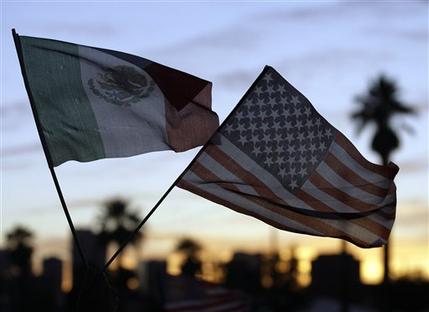LOS ANGELES on Wednesday became the largest city yet to boycott Arizona over its tough new law targeting illegal immigration in a move that likely will affect some $8 million in contracts with the state.The City Council voted 13-1 to bar Los Angeles from conducting business with Arizona unless the law is repealed. The vote followed an emotional council discussion during which many members noted that their ancestors were U.S. immigrants.
Mayor Antonio Villaraigosa already has said he would approve the boycott.The proposal could affect investments and contracts worth as much as $52 million, including contracts for airport, harbor and trucking services, according to a report from the city’s chief legislative analyst. That report recommends the council consider suspending travel, cutting contracts and refraining from making any new ones with Arizona-based companies.
But Councilwoman Janice Hahn, who co-authored the resolution, said it would be impractical to cancel most of those deals and only about $7 million to $8 million in city contracts probably would be affected.
“US Airways is based in Arizona and they certainly fly in and out (of Los Angeles)” and it would hardly be feasible to end those flights, Hahn said before the council vote.Hahn said the Los Angeles boycott also won’t affect the city’s Department of Water and Power, which has wind farm and nuclear energy contracts in Arizona. Among the contracts with Arizona companies that conceivably could be terminated include those for helicopter services, Taser guns, waste management, engineering and surveillance equipment.
Hahn said “the best scenario” would be to turn around and give those contracts to California suppliers.The resolution claims that Arizona’s new law encourages racial profiling and is unconstitutional. The law, set to take effect July 29, requires police enforcing another law to question a person about his or her immigration status if there is “reasonable suspicion” that the person is in the United States illegally and makes it a state crime to be in the country illegally. Several lawsuits seeking to block its implementation are pending in U.S. District Court in Phoenix.
Some polls have shown strong popular support for the Arizona law and critics are concerned that other states may follow up with their own versions.Several cities across the country have passed resolutions or urged boycotts to protest the law, including California cities such as Oakland and San Diego. A nonbinding resolution approved Tuesday by San Francisco city supervisors urges a boycott of Arizona-based businesses and asks sports leagues not to hold championship games or tournaments there.
Arizona Gov. Jan Brewer said the boycotts are unfortunate and misguided, primarily because the law mirrors a federal requirement that legal immigrants carry immigration papers.”It’s already the law in the United States, and I have a responsibility to stand up and protect the people of Arizona and we will do that,” Brewer said Tuesday.Charges that the law will lead to racial profiling are “just pure rhetoric,” Brewer said.
“I find it really interesting that we have people out there that are attempting a boycott in favor of illegal actions in Arizona. That to me is just unbelievable.”Of the resolution in Los Angeles, Hahn said: “We want to stand back and say that we’re against it. We’re hoping that Arizona will be the last state to do this instead of just the first state to do it.”The city staged a similar economic boycott against South Africa during apartheid and against Colorado after voters in 1992 passed a state law repealing local ordinances that banned discrimination against homosexuals.(AP)

